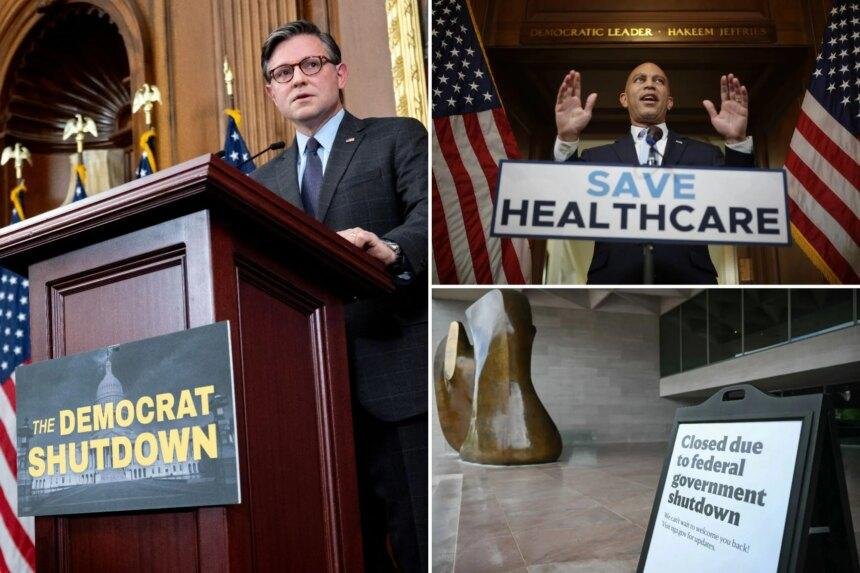Health Care at the Center of U.S. Government Shutdown Negotiations
As the U.S. government enters its seventh day of shutdown, health care has emerged as a pivotal issue in negotiations between Democrats and Republicans. With millions of Americans facing potential increases in their health insurance premiums, the debate over extending subsidies for the Affordable Care Act (ACA) has intensified, revealing deep divisions within Congress.
The Stakes of Health Care Subsidies
Democrats argue that health care is a critical concern for the majority of Americans, and they are leveraging this sentiment in their push for an extension of ACA subsidies. These subsidies, initially introduced in 2021 during the COVID-19 pandemic, have made health insurance more affordable for millions. However, as the new year approaches, many individuals enrolled in ACA marketplaces are set to receive notifications about rising premiums, prompting urgent calls for action.
While some Republicans express willingness to extend these subsidies, a significant faction remains staunchly opposed. They view the current debate as an opportunity to dismantle the ACA, a law that has faced Republican criticism since its inception under former President Barack Obama in 2010. Despite ongoing efforts to repeal or modify the ACA, enrollment has surged, with approximately 24 million Americans now relying on its provisions, largely due to the financial support it offers.
Diverging Republican Perspectives
The Republican Party is not monolithic in its approach to health care. Some members, like Senate Majority Leader John Thune of South Dakota, have indicated a willingness to negotiate on extending subsidies, albeit with conditions. Thune has emphasized that any discussions must occur after the government is reopened, suggesting that the White House’s stance will significantly influence the outcome.
Conversely, other Republicans, such as Florida Senator Rick Scott, argue that the ACA itself is the root of the problem and advocate for a complete overhaul of the system. House Speaker Mike Johnson has echoed this sentiment, asserting that the health care system is fundamentally flawed and requires substantial reform.
Public Sentiment and Political Calculations
Democrats believe that public opinion is on their side, particularly as many individuals affected by potential premium increases reside in Republican-leaning districts. Senate Majority Leader Chuck Schumer has pointed out that the American public is deeply concerned about the health care crisis, which could pressure Republicans to engage in negotiations.
However, the political landscape is complicated. Former President Donald Trump has publicly stated that he is open to working with Democrats on health care issues but insists that the government must first be reopened. This stance reflects a broader Republican strategy to leverage the shutdown as a bargaining chip in negotiations.
Bipartisan Efforts and Challenges
Amidst the partisan gridlock, some senators from both parties are attempting to forge a path forward. Republican Senator Mike Rounds of South Dakota has proposed a compromise that would extend subsidies for one year while gradually phasing them out. Meanwhile, Senate Appropriations Committee Chairwoman Susan Collins has suggested advancing bipartisan spending bills while committing to future discussions on health care.
Despite these efforts, many Democrats remain skeptical of vague commitments, insisting on concrete actions. The ongoing stalemate highlights the challenges of reaching a consensus in a polarized political environment.
The Impact on Federal Workers
As negotiations stall, the implications of the shutdown extend beyond health care. Hundreds of thousands of federal workers are currently without pay, and the White House has hinted at potentially blocking backpay if the government reopens. This situation raises significant concerns, especially since Trump had previously signed legislation ensuring backpay for federal employees during funding lapses.
House Speaker Johnson has emphasized the urgency of resolving the shutdown, suggesting that the potential loss of backpay should motivate Democrats to act. However, Democrats, including Washington Senator Patty Murray, have countered that federal workers are entitled to their backpay, regardless of the circumstances surrounding the shutdown.
Conclusion
The ongoing government shutdown underscores the complexities of health care policy in the United States. As Democrats and Republicans navigate their differences, the stakes are high for millions of Americans who rely on affordable health insurance. With public sentiment increasingly focused on health care, both parties may need to reassess their strategies to find common ground and resolve the impasse. The outcome of these negotiations will not only impact health care policy but also the livelihoods of federal workers and the broader political landscape as the nation moves forward.











